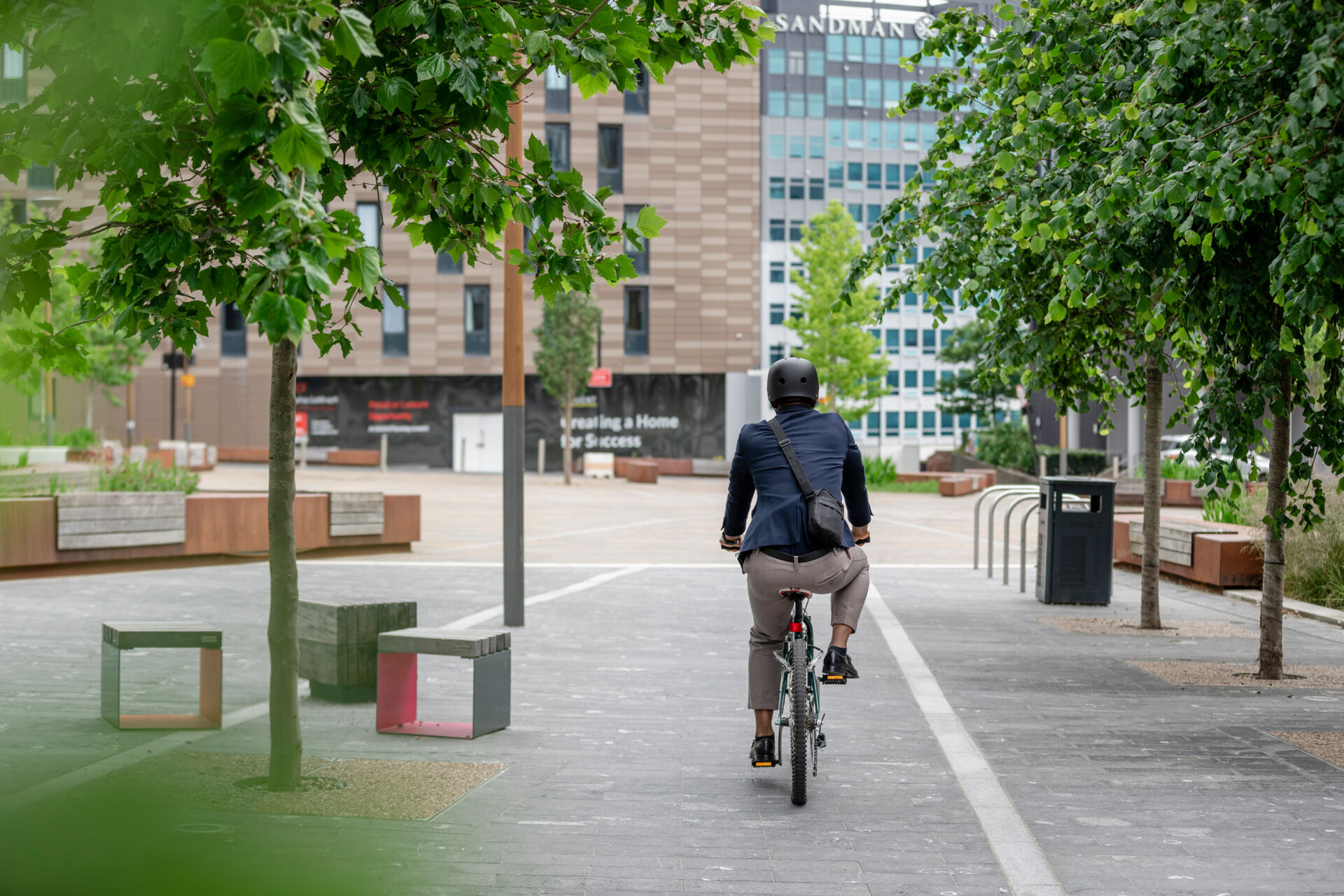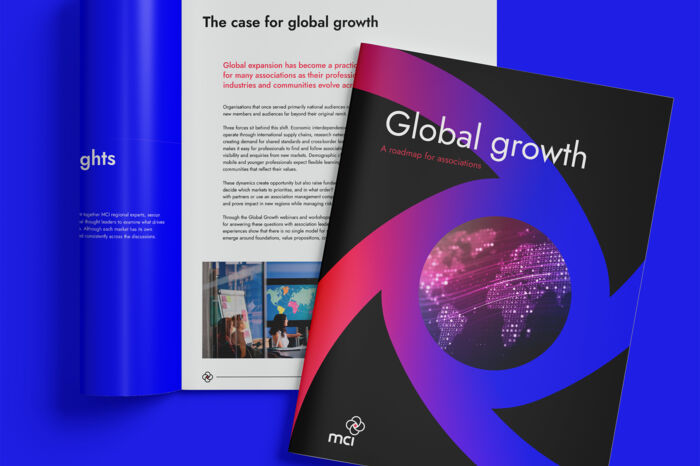
MCI was awarded the privilege of being the only agency presenting to this prestigious group. We focused on topics related to the demands of new generations that are making buying decisions based on sustainability – and how this is impacting marketing, sales, visibility and relationships.
Then we looked at new buyer profiles connected to sustainability impact, and lessons from business sustainability examples around the world. I finished by trying to articulate for them the opportunities and advantages linked to sustainability as a business strategy.
For some procurement professionals, sustainability is still perceived as being additional work that's difficult and expensive. One of the ways that we can make sustainability principles more relevant and actionable is to come in with opportunities instead of just difficulties.

The opportunity in sustainability as a business practice
We need to move the discussion along from the operational perspective where the sentiment is, "Oh yeah, OK we need to recycle, we need to stop having red meat, we need seasonal fruit...” We need to show them how sustainability as a business strategy is a business advantage.
I used the example of the signature shopping experience at their luxury stores: customers wanting to view the range are usually served a glass of champagne with a strawberry in it. And this happens across the planet. Every single day. Think of the business advantage of providing a seasonal fruit sourced within 10 square kilometres of the store, instead of a strawberry in Geneva in the middle of the winter, which must come with some procurement difficulties and certainly some expense.
I explained that when such changes are made, they should claim it loudly to their customers: "Remember that strawberry we used to offer? Well, now we're more sustainable. We source locally grown, in-season fruit. The local producer of the kiwi fruit in your champagne today is Jean. He produces the best kiwi fruit on his farm right next to Lake Geneva!"
That’s how you totally change the discussion. It’s good business because you’re espousing sustainable principles, but it’s probably also going to save money at the end of the day.
Why sustainability is important for development?
There's a clear image gain when you're more intricately invested in the local socio-economical networks. On top of that, you benefit from shorter lead times. Shorter delivery times, much less risk in terms of delivery because you're sourcing from the factory an hour away and not from one that’s three days’ shipping away. It's safer, faster, cheaper, affords better local visibility and so on.
Is it really necessary to replicate, exactly, an event in different cities around the world? Of course, MCI can make this happen for our clients, but there is an opportunity cost: the chance to (a) contribute to local economies, (b) reduce each event's carbon footprint, and (c) enjoy considerable savings.
Instead, define the “must haves” of your global event. Then, rather than shipping those exact must-haves to different locations around the world, localise: localise drinks, localise food, localise creation, hire local artists. Not only do you transport much less, which lowers your carbon footprint and saves money, you also have a far more positive impact on the local economy of the destination hosting your event.
Of course, there are other areas where sustainable choices make good business sense. This luxury group has 75 brands. There is nothing stopping them approaching destinations as a group and not as a series of entities. Why not have all – or some – of the brands go to the same place and have their events back-to-back, or in three series, instead of 75 individual projects?
People who need to travel to every event from, say, Europe, travel just three times instead of travelling 15, and suddenly there are opportunities for reusable production, from concept to final product. For example, you produce just one stage set that can be adapted to each brand.
Another important trend that can be tapped into for sound business results is brand collaboration. This seems obvious to us but is sometimes an ‘aha’ moment for clients: the potential for their own brands to collaborate, and to cobrand events. If two brands are going to the same destination, why not merge the events? And take that collaboration into other areas, like serving the sister brand’s champagne at another brand’s event?
As Catherine Cote says, quoting Harvard Business School Professor Rebecca Henderson: "There’s good reason to believe that solving the world’s problems presents trillions of dollars’ worth of economic opportunity... Leading with purpose can positively impact both the planet and your business’s financials.”
These are the messages we must get across if we’re to bridge the “relevancy gap” and make sustainability strategy more relevant and actionable.
MCI can work with you to ensure that your event is not only spectacular but also triple-bottom-line driven: People, Planet, Profit. Let's make a difference, one event at a time. It’s the right thing to do and it’s good for business.
Read on for 7 reasons to let MCI help you green your event...

7 reasons to let MCI help you create a green event
Events have the power to inspire, entertain, and bring people together. But they also come with a footprint – from the resources consumed to the waste produced. As an events company committed to the future, MCI believes in creating events that leave lasting memories, not lasting damage. Here's why you should care and how we can help:
1. The business case for sustainability
Relevance: Modern attendees appreciate and often expect environmentally conscious events. By integrating sustainability, your event can appeal to a wider audience and potentially even garner positive media attention.
Return on investment: Sustainable practices, like reducing waste or energy use, can lead to cost savings in the long run.
2. Engage and inspire your attendees
Active participation: Give attendees (and your colleagues) a role in the event's sustainability, like a tree-planting initiative or charity programme to give back to the local community; encourage them to bring a re-usable water bottle, to recycle, use public transportation, choose plant-based meals...
Educate: Use the event as a platform to share the importance of sustainable practices, creating a ripple effect beyond the event itself.
3. Our green event planning process
Sustainable partners: MCI works closely with vendors who prioritise eco-friendly products and services, ensuring a green supply chain.
Eco-friendly venues: Our curated list of venues prioritise energy efficiency, water conservation, and other sustainable practices.
4. Transparency is key
Show, don’t just tell: Post-event, we do a sustainability report, detailing the positive impacts and areas for improvement. This not only boosts your brand image but provides insights for future events.
Certified excellence: MCI agencies adhere to various recognised standards, such as ISO 20121, assuring you of our commitment to green events.
5. Continuous evolution
Feedback-centric: MCI believes in growing with each event. Post-event feedback from attendees can offer insights into further enhancing sustainability efforts.
Stay updated: We're always on the lookout for the latest in sustainable event practices, ensuring you're always at the forefront of change.
6. Collaboration for a greater sustainability impact factor
Joint initiatives: Partner with local environmental NGOs, agencies or sustainable brands to enhance the event's sustainability pillars, profile and community impact.
Shared learning: Engage in dialogues or workshops pre-event to ensure that all stakeholders, including you, are aligned to the sustainable vision.
7. Communication makes perfect
Promote sustainability: Make your commitment to sustainability a key part of your event's marketing narrative.
Consistency: From digital invitations to on-site banners, we ensure all communications reflect and champion our joint commitment to sustainability.
For more information on this topic, read Antonio's article: The Importance of Green Marketing.




